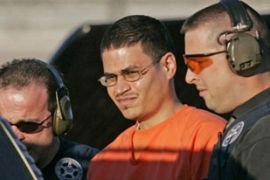Padilla had originally been designated an “enemy combatant”. He spent three-and-a-half years in a US military prison until he was transferred to civilian custody last year.
Nuclear device
The US administration accused him of plotting to detonate a nuclear device inside the US, but he was never charged.
|
|
Padilla has been in federal custody since May 2002, when he was arrested in Chicago on his return from Egypt.
President Bush ordered Padilla to be held in a military prison.
The US administration accused him of plotting to set off a radioactive bomb in the country, but he was not formally charged with such an offence.
He was transferred to civilian custody in 2006, even as a challenge to Bush’s authority to hold Padilla without charge was pending in the Supreme Court.
Padilla faces life in prison if convicted.
|
Instead, Padilla and his co-defendants, Adham Amin Hassoun and Kifah Wael Jayyousi, stand accused of being part of “support cell” providing recruits and money to al-Qaeda-linked groups.
The defendants had sought separate trials, but their motions were denied by Marcia Cooke, the district judge.
Cooke ruled that the government had ample evidence that the three were connected in a conspiracy: Hassoun and Jayyousi working as recruiters, fundraisers and suppliers, and Padilla as one of their recruits.
Carl Tobias, a University of Richmond law professor who has followed the case, said: “It makes it significantly more complicated than if they tried each one separately, but if it all fits together in a narrative it does make sense.”
Conspiracy
To prove a conspiracy, prosecutors will have to show that each of the three was involved in at least one act to provide material support to “terrorists”.
In Padilla’s case, prosecutors will present as evidence a form they say is an application to attend an al-Qaeda training camp in Afghanistan. They say Padilla completed the form in July 2000 and it bears his fingerprints.
“The most important piece of evidence against Padilla is that form,” Vladeck said.
For Hassoun and Jayyousi, the prosecution will present more than 100 tapped telephone conversations, intercepted while the two were under FBI surveillance.
The conversations are mostly in Arabic and in them the defendants discussed family trips, sports and food, but prosecutors say they were using a code.
‘Showcase trial’
Jurors will also be asked to consider the meaning of items in Jayyousi’s Islam Report newsletter.
The prosecution alleges that Hassoun used coded references to refer to weapons and military supplies.
They say he used words such as “soccer equipment” for guns and “tourism” for armed struggle.
For judge Cooke, it will be difficult to ensure that jurors are not swayed by media coverage of the case.
Jeffrey Harris, president of the Florida Association of Criminal Defence Lawyers, said: “This is a showcase trial that will be publicised all over the world. It doesn’t get much bigger than this.”
Cooke has also ordered that jurors hear no mention of the “dirty bomb” plots nor anything Padilla told interrogators during the three-and-a-half years he was held in military custody.
But the jury is not sequestered. Instead members have been repeatedly admonished not to pay attention to news accounts.
